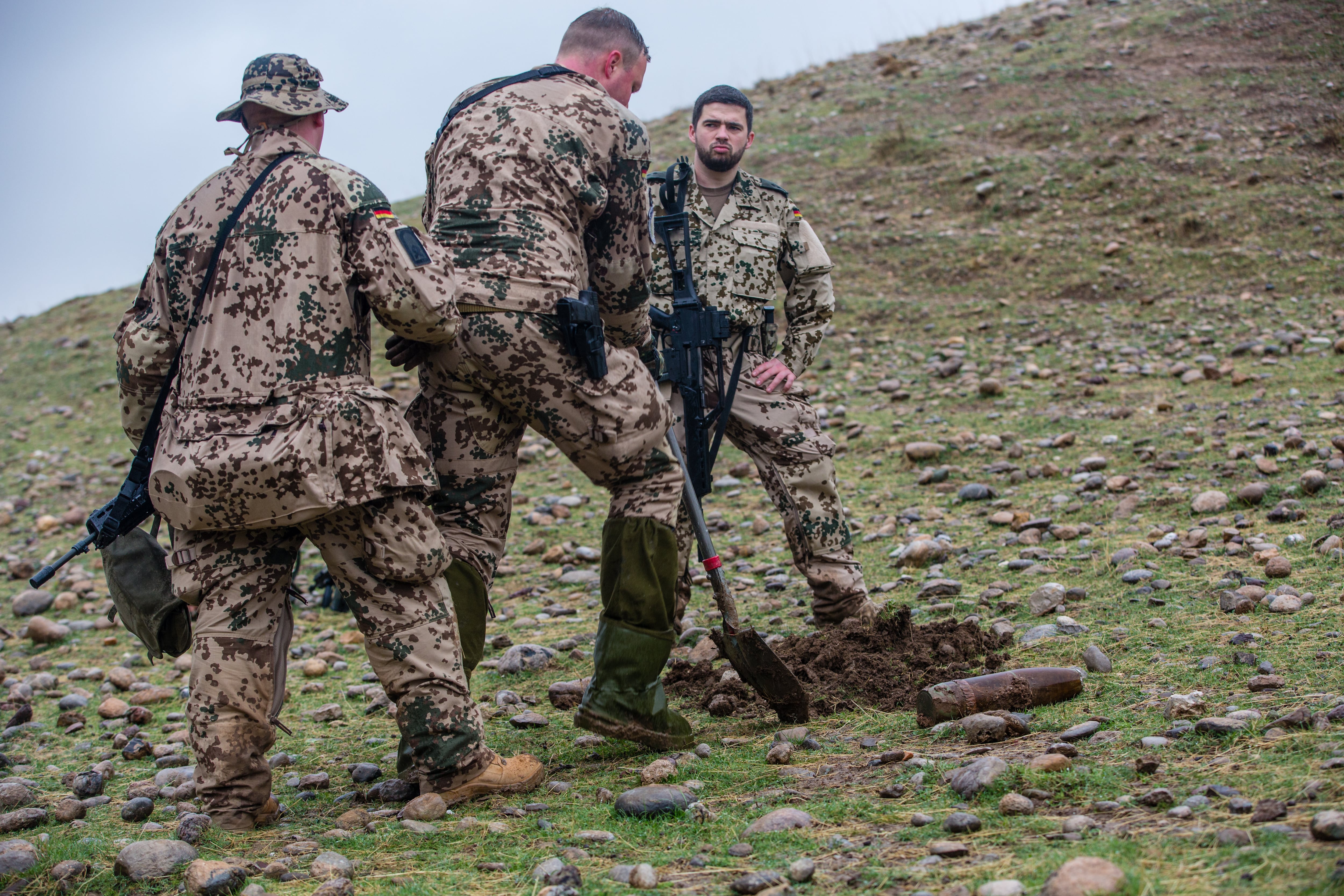U.S. allies involved in operations in the Middle East appear uninterested in the increasingly bellicose rhetoric from the White House and Pentagon regarding Iran.
Germany and the Netherlands suspended military training operations in Iraq due to increasing regional tensions, a Spanish frigate was recalled from its voyage with a U.S. Navy carrier strike group and a British general was sharply rebuked by U.S. Central Command after telling reporters that Iranian-backed militias in Iraq and Syria did not pose an increased risk to U.S. and coalition allies fighting the Islamic State.
National Security Adviser John Bolton, and other administration leaders, have repeatedly warned that intelligence shows there is an increased threat that Iran or its proxy groups could attack the U.S. or its allies, though they have withheld the details of that intelligence.
European allies voiced concern this week that the tensions could accidentally trigger a conflict after the Pentagon dispatched a Patriot missile defense battery, a bomber task force, an amphibious transport dock and a carrier strike group to the region.
“We are living in a crucial, delicate moment where the most relevant attitude to take — the most responsible attitude to take — should be that of maximum restraint and avoiding any escalation on the military side," Federica Mogherini, the European Union’s diplomatic chief, said Monday.
The military posturing is paired with President Donald Trump’s economic sanctions to pressure Iran to renegotiate the nuclear deal that the U.S. abandoned a year ago, according to Lawrence J. Korb, a senior fellow at the Center for American Progress and former assistant secretary of defense.
“For Bolton, on the other hand, I think he wants to send the forces into the region and he hopes the Iranians will respond and then he can go to Trump and say ‘well, you got to do a one-off attack like we did in Syria,’" Korb told Military Times. He added that European allies want to continue the previous nuclear deal for fear of starting a nuclear arms race between Saudi Arabia and Iran.
“A lot of people say it looks like the prelude to our invasion of Iraq, but I think it’s much more like the Gulf of Tonkin in 1964 when you put all those troops in there," Korb said. "Then you get misperceptions. Then you get people overreacting.”
The Gulf of Tonkin incident is often seen as a cautionary tale for U.S. war planners. During a confrontation off the shores of Vietnam, now discredited reports of enemy vessels coming into contact with U.S. warships offered the catalyst for U.S. involvement in the Vietnam War.
The parallels between that incident and the current situation near Iran were highlighted by a series of questionable claims of “sabotage” to oil tankers near the Persian Gulf over the weekend.
In addition to sending additional military assets to the region, the U.S. State Department ordered the departure of all non-emergency U.S. government employees from Iraq at the U.S. Embassy in Baghdad and the U.S. Consulate in Erbil over the security threats.
A spokesman for the German Defense Ministry said Wednesday that Germany is suspending military training operations in Iraq due to increasing regional tensions. Germany has roughly 60 soldiers near Baghdad to train Iraqi security forces, as well as about 100 troops in the Kurdish regions of northern Iraq, according to Deutsche Welle.

Spain also recalled the frigate Mendez Nunez that was accompanying the U.S. aircraft carrier strike group
“The U.S. government has taken a decision outside of the framework of what had been agreed with the Spanish Navy,” acting defense minister Margarita Robles said, according to Reuters.
Netherland’s state broadcaster NOS reported on Wednesday that the country also suspended its military training mission because of the security threat. The 50-troop mission primarily trains Kurdish forces.
Despite the allied response, a top British Army officer in Iraq said the threat level from Iranian-backed militias in Iraq had not risen in recent weeks.
“Am I concerned about the danger: no, not really," Army Maj. Gen. Christopher Ghika, a deputy commander with the anti-ISIS coalition, said Tuesday of Iranian threats.

Ghika said that force protection measures have been reviewed in “light of the events in the last week,” and were “completely satisfactorily.”
CENTCOM pushed back against Ghika Tuesday afternoon.
“Recent comments from OIR’s Deputy Commander run counter to the identified credible threats available to intelligence from U.S. and allies regarding Iranian backed forces in the region,” said Capt. Bill Urban, CENTCOM’s lead spokesman. “OIR is now at a high level of alert as we continue to closely monitor credible and possibly imminent threats to U.S. forces in Iraq.”
Despite the sharp rebuke from the U.S. military, British defense officials issued a statement Wednesday morning backing up Ghika’s comments that there has always been a threat from Iranian proxies in the region, as well as from other actors, but that threat has not increased in recent weeks in Iraq and Syria.
U.S. officials have so far declined to comment on the record regarding what threats they have identified coming from Iran.
The New York Times reported Tuesday that a U.S. “intelligence report” had collected data in April through “intercepts, imagery and other information" that indicated “Iran was building up its proxy forces’ readiness to fight and was preparing them to attack American forces in the region.”
The Times did not say which U.S. intelligence agency compiled the report, nor did it identify the officials who provided the information. The failures of pre-war intelligence leading up to the Iraq War — which did not properly vet sources and was selectively curated to mislead Congress — was the subject of a U.S. Senate investigation in the years following the 2003 Iraq invasion.
Saudi Arabia and the United Arab Emirates said over the weekend that some oil tankers affiliated with their countries were hit by “sabotage attacks” in the Persian Gulf. Though, no link has been drawn that could connect those attacks to Iranian forces.
The increased tensions come at the same time as Washington is ratcheting up pressure on the Iranian regime over the nuclear deal that the U.S. abandoned one year ago.
European signatories to the deal — Germany, the United Kingdom and France — have criticized the U.S. government’s approach and urged Iran to remain in compliance with the deal despite U.S. economic sanctions and the military build-up in the region.
Kyle Rempfer was an editor and reporter who has covered combat operations, criminal cases, foreign military assistance and training accidents. Before entering journalism, Kyle served in U.S. Air Force Special Tactics and deployed in 2014 to Paktika Province, Afghanistan, and Baghdad, Iraq.





